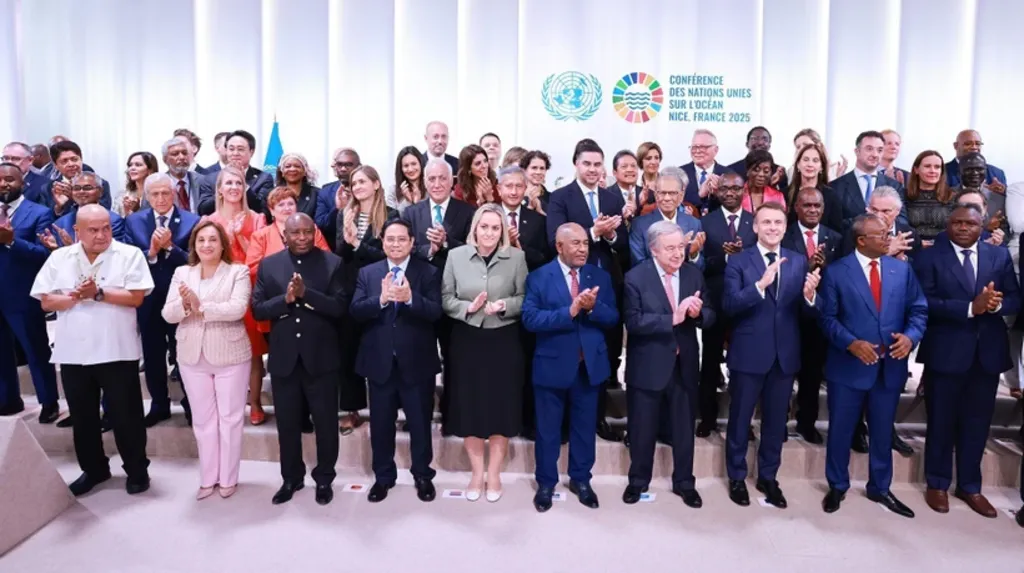 |
| World leaders pose for a photo.__Photo: VNA |
Prime Minister Pham Minh Chinh joined global leaders on June 9 at a special treaty event to advocate for the signing Agreement under the United Nations Convention on the Law of the Sea on the Conservation and Sustainable Use of Marine Biological Diversity of Areas beyond National Jurisdiction (BBNJ Agreement), widely known as the High Seas Treaty – the most important ocean legislation since the dawn of the new millennium.
Thirty-five nations that have signed or officially deposited their instruments of ratification or approval took part in the event, which was within the framework of the ongoing third United Nations Ocean Conference (UNOC3) in Nice, France.
Deputy Prime Minister and Minister of Foreign Affairs Bui Thanh Son presented Vietnam's ratification document to UN Under Secretary-General for Legal Affairs and Legal Counsel Elinor Jane Britt Hammarskjöld, officially confirming the country's approval of the High Seas Treaty.
Vietnam is one of the first nations to sign the agreement on its opening day and among the leading countries to complete internal procedures for treaty membership. This sends a powerful message of Vietnam's role as an active, responsible member of the international community, working alongside global partners to address ocean and marine challenges.
The participation of PM Chinh and Vietnam's high-level delegation in this treaty event highlighted the Vietnamese Government’s determination and contributions to building global oceans of peace, prosperity, and sustainable development.
At the UNOC3, the international community expressed hope that 60 countries will soon complete ratification procedures, enabling the treaty to take effect in this year.
Marine genetic resources in international waters is a promising new frontier for the 21st century, with areas beyond national jurisdiction covering more than 60 percent of the ocean's surface. These regions boast exceptional biodiversity, including rare genetic materials with significant economic potential and high scientific value, particularly for pharmaceuticals and cosmetics.
Currently, only developed nations and private companies with advanced marine and biotechnology capabilities as well as substantial financial resources can collect deep-sea genetic resources and develop profitable applications. No existing international document governs the obligation to share benefits as well as conserve the resources. The treaty marks a historic milestone in the international community's efforts to protect marine environments while implementing the 2030 Agenda, specifically Sustainable Development Goal 14 on the conservation and sustainable use of oceans, seas, and marine resources.
This is the third treaty negotiated and signed within the framework of the 1982 UN Convention on the Law of the Sea, reaffirming the convention's role as a comprehensive legal framework adjusting all ocean and sea activities. The treaty will take effect 120 days after 60 countries submit ratification or approval documents.- (VNA/VLLF)









